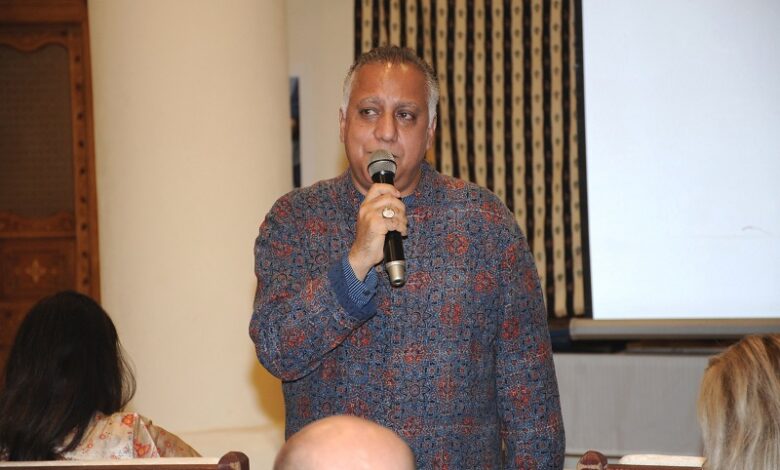India, a treasure trove of craftsmen, skill, talent and tradition
Asaf Ali, Innovator, Dreamer, Co-founder of Kashmir Loom


By Sangeeta Jamwal
Special to The Times Kuwait
Kashmir Loom, the luxury brand from India showcased a unique, bespoke collection of exquisitely woven and embroidered cashmere shawls, home furnishings and papier mâché artifacts at the Sadu House, in downtown Kuwait over four days in January.
I had the good fortune of speaking to co-founder of Kashmir Loom, Asaf Ali, an unassuming gentleman who seemed to house decades of secrets of the breathtaking Kashmir valley in his heart.
Seated amongst the finest pieces of artistry, painstakingly crafted by artisans of Kashmir, a magical and mysterious land, I was reminded of the great poet Amir Khusro’s famous words ‘Gar firdaus bar-rue zameen ast, hami asto hami asto, hami ast!’ (If there is paradise on Earth, it’s here, it’s here, it’s here’)
Indeed, as Asaf Ali started speaking on the origin and history of Kashmir Loom I sat in rapt attention.

Jenny Housego, an Englishwoman and Asaf Ali, co-founders created the brand Kashmir Loom, bringing to life unconventional woven luxury that was hugely impactful. Housego came to India 38 years ago with her then husband, journalist David Housego. Housego’s intense passion for color, texture and textile led to establishing ‘Shades of India’ with him.
Housego’s contribution to creating global awareness on tribal rugs is unparalleled. In 1977 she penned a book ‘Tribal Rugs of Iran’ that is till date considered a bible on tribal rugs. The nomadic Shahsavan tribe from Persia wove the most visually appealing rugs featuring vibrant colors and bold, geometric patterns, notes Housego in her book over which she worked painstakingly doing the needful research and gaining understanding of tribal rugs.
She also co-authored a book ‘Bridal Durries of India’ with Ann Shankar, a member of the Far Eastern Department of the Royal Ontario Museum. Shankar is a textile historian and an enthusiast, passionate about the source of yarn, she is also known for reviving the use of natural dyes in durrie weaving in the State of Punjab.
Traditionally, in India women wove durries which they carried as part of their trousseau. The durries, each one uniquely crafted by the brides themselves, were given pride of place in their new homes. Housego and Shankar visited some of the brides to learn the rich history behind these flat-weave durries.

Housego was known to learn from and be inspired by craftsmen, at the same time she imprinted and enthused her indelible stamp on any project she undertook. Her love of designing, creating, and play of color are legendary and formed the backbone of her next baby, Kashmir Loom. Asaf Ali was all of 16 years old, apprenticing with his uncle who dealt in rugs when Housego chanced upon him. She placed blind faith in him to refurbish her expensive rugs and he did a great job, exceeding Housego’s expectations and prompting her to notice his raw potential.
The rest, as they say, is history. Kashmir Loom was formed in 1999 with Housego and Ali as co-founders, and Ali roped in his two brothers for the fair amount of leg work involved in setting it up.
Housego was the creative brain behind the designs, each weft and weave of every item that Kashmir Loom crafted from scratch. She was also ambitious and passionate about displaying the hand-woven pieces, the rich tapestry of India in museums.
While this was falling in place, in 2006 Housego unfortunately suffered a stroke resulting in left side paralysis. Moved by this unexpected predicament, Asaf Ali decided to dedicate his life to her, nurture her and give her the love she selflessly gave everyone. She touched a million hearts with her book ‘The Woven Life’ as her memoir, a book co-edited by journalist Maya Mirchandani.

Asaf Ali found himself at a vulnerable crossroad, how could he keep the Kashmir Loom dream going with Housego indisposed? At this point Samina Zaidi from the well reputed Aga family in Kashmir joined Ali to carry Housego’s dream forward.
Asaf Ali was very open about his love for the country he belongs to — “there’s no other place in the world that houses so many categories of craftsmen, who can work magic with their hands.
India is the treasure trove of craftsmen, skill, talent and tradition, we have so much to offer the world. Kashmir Loom did everything differently, all while staying within the core idea of remaining original. It is also our responsibility to ensure the sustainability of the craft, but in order to sustain you have to reach the larger audience.
We are constantly adapting to changing times; especially as Indian craftsmanship is making a significant impact globally. Our mission is to maintain quality but innovate constantly.

What sets us apart is that Kashmir Loom invests heavily back into the craft, into the ‘karkhanas’ (workshops), the ‘nakshas’(looms), the process, making them more streamlined, more sustainable, and the final product more attainable in the market. Jenny is an academician, a teacher who has collected hundreds of books and diagrams.
She gives of herself to everything created, enthuses her own spirit and knowledge and makes the craft her own. Yes, craftsmen occasionally resist change, as when Jenny introduced the metallic yarn for pashmina weaving, it took the craftsmen some time to come around.”
Kashmir Loom collections have been displayed in museums globally. One of the recent showings was at the ‘Museum of Fine Arts’ at Houston, Texas, where Gary Tinterow the director of the museum is very passionate about Indian textiles and extended full support to Kashmir Loom.
After this interesting chat I had one last question for Asaf Ali; what is your dream for Kashmir Loom?

“We are backed by a legacy of 300 odd years, we need to convert this legacy into motivating and inspiring our next generations. We should create new galleries, concepts, collaborations and not let the legacy be forgotten.
India is not cheap, Indian craft is not cheap. My dream is to create an ‘atelier’, to create a resource center, a house where ideas are exchanged, a place that holds old collections, infinite books, where students can exchange ideas.
Now, we even have the power of social media, which means there is no mystery remaining. Artisans sometimes resent social media, but then they realize that it cuts out the middlemen. I firmly believe that everyone should grow together, our craftsmen should grow with us. On principle, Kashmir Loom looks after our master craftsmen very well.

After all, it is their invaluable contribution that has made Kashmir Loom a brand of global repute today. Our competition is no longer with Indian brands, we would like to be the first among international brands that create woven luxury. Kashmir Loom should remain the best luxury brand of India and be among the finest in the world.”













